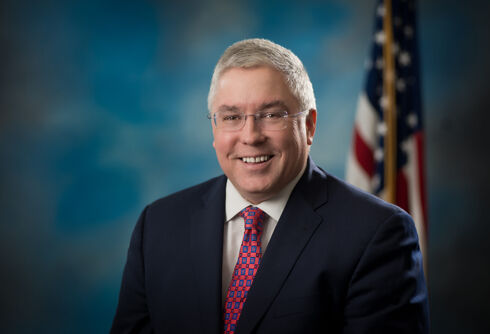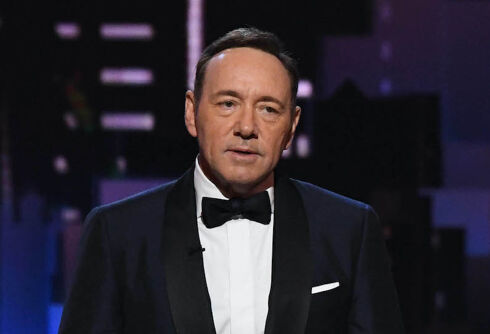Once and possibly future Judge Fransheneka “Fran” Watson is running for Probate Court in Houston, where she’ll oversee how wills are administered and estates are settled and sometimes appoint a legal guardian for minors or dependent adults.
It’s a job with responsibilities Watson has spent her entire career preparing for, as a former municipal court judge, as an attorney specializing in family law, and lately as staff attorney for another probate court in Harris County.
Related:
Sen. Kim Jackson gets real on anti-trans legislation: “It is killing kids”
She talked to LGBTQ Nation about her farm, Atlanta as a Black mecca, and one surprising thing she has in common with Marjorie Taylor Greene.
In our “Hot Seat” conversation, Watson was ebullient, disarming, unreservedly “emotional,” and slightly anesthetized — she literally stepped out of a dentist appointment halfway through it to share her time.
Your LGBTQ+ guide to Election 2024
Stay ahead of the 2024 Election with our newsletter that covers candidates, issues, and perspectives that matter.
Judge Fran Watson: I apologize for my speech. They’re doing some little dental work. And so I told them, I said, I have a 2:30, and we’re gonna get it taken care of. So I just wanted to make sure—I stepped out and then I’m gonna go back in, but it’s nothing painful.
LGBTQ Nation: You’re literally in the middle of a dentist appointment.
Yes (laughing).
Oh, my God.
Because this will happen (laughing).
Well, I was going to ask where you’re speaking from and now I know, and it’s a first (she laughs). And with that, I’ll just dive right in.
During your time in college, you took a class called Psychology and the Law, which you say started you on your path to a career in the law. Describe that class and how it’s informed your work as an attorney and a judge.
I was a psychology major, and Psychology and the Law talks about witness statements, how juries are chosen, really the social aspect of what happens with the law. And what I would see is, particularly when it came to people getting wrongfully convicted, when they would take witness statements, people didn’t have the memory, or they didn’t remember it exactly as it was. And then they would rely on this testimony and then you had all of these different folks that were being wrongfully convicted.
So for me, it was really about understanding, not only knowing the law, but I think it really shaped me to be able to have kind of that compassion and that connection, and really be able to connect with clients. Because while you read cases in law school, these are real people with real problems, and taking what I’ve learned over in psychology, as well as what I’ve learned in law school, kind of brought it all together, and I think it helped shape me on what type of lawyer I would be.
You went from getting thrown out of high school for supporting your family, to earning a GED, to getting a full-ride scholarship to college and graduating magna cum laude before earning your law degree at Thurgood Marshall School of Law at Texas Southern University and again graduating magna cum laude. What makes you so smart?
(Laughing) I’ve been asking myself that for 46 years. But, you know, everyone I know — my mom, my grandmother — they used to tell me that I had all this potential. Maybe I’m smart because I’ve always taken things at my own speed. I really just tried to study and really get prepared. Because what I’ve learned in life is that we all are smart. There’s just different ways that we learn, different ways that we take in information. Like I said, I’ve been trying to figure this out all my life (laughing). Especially for someone walking around with impostor syndrome as I do.
Even as an undergraduate studying psychology, your professors pegged you for a career in the law, and nicknamed you Judge Watson. So you’ve been hearing that for a long time.
Yeah, I have.
What qualities did you demonstrate in school that led them to that conclusion?
They said I had a command of who I spoke to. No matter who I would speak to, people would feel like they were the only person in the room. And I never even noticed that. I would sit back and—you know, you always got some people who want to hear themselves talk—but I would wait and let everyone talk because then I would be able to take all of their information, paraphrase it, and then kind of come up with, like a solution, you know. I try to be a consensus builder. I want to make sure that we all have a voice in a solution. So they would say, that’s some judicial qualities. I’m gonna start calling you Judge Watson.
You’ve said that you live by Fannie Lou Hamer’s maxim, “Nobody’s free until everybody’s free.”
You’re damn right.
What’s one thing that we can all do to make that a reality?
Listening to one another. I think that is the key. And just having empathy for each other. When I started this, I would tell people, “I will do whatever I can. I will be in a leadership position, or I will sharpen your pencil.” Whatever I can do to try to help us move along, and recognizing that what our community needs are, what our family needs are, may look a little different from yours. And just having a little empathy to that. If we collectively agree to kind of empathize with our differences, then that will help us achieve true liberation.
As an attorney, you dedicated 30% of your time to pro bono clients. What kinds of cases did clients come with and what’s the most satisfying experience you’ve had representing one?
Mostly guardianship cases, or some states call it conservatorship. I took on helping with gender marker changes for people, because documentation is key when people know their truth and they have the document that they can present, so you’re not having to out yourself every time you go somewhere or do something. Debt collection cases, I really tried to help on that, because sometimes people will just not show up to the hearings and so they’ll get a default judgment against them and it ruins your credit, and some of those cases were being filed after the statute of limitations but they weren’t there to defend themselves, and that would have been a defense to get it dismissed.
I just really tried to do the cases that would be community-centered because I just feel like I owe a debt because someone looked at my scores and led me to college. I just feel that there have been so many people in the community that have been so community-forward that it’s helped me and that’s why I focus on what I focused on.
Part of your private law practice was devoted to LGBTQ+ family law. What are some things that are unique to LGBTQ+ families when it comes to the law?
Before marriage equality, everything was done by contract. With adoption, making sure that you’ll have a second parent adoption, you had to file wills, you had to have everything in a contract.
Now with marriage equality, I guess the uniqueness is that our couples are dealing with the same kinds of cases that everyone else is because marriage is accepted. With marriage equality, just like all other couples, you can have highly contested divorces, especially when you’re dealing with property, when you’re dealing with access to the children, all of these things. And so that change had moved through my practice.
You served as president for a nonprofit that provides services for LGBTQ+ youth called Grace Place, and you’re still a financial supporter there. How has working with gay kids informed your other work and your outlook on being gay yourself?
First of all, I said, “Oh, my gosh, just see the courage.” Just being able to live authentically, you know, even as a youth, as a teenager, as a young adult, and it just really kind of shook my mind that you really do have to be 100% authentically yourself. Like, as a Black lesbian, walking around with an afro in a court? In a probate court? Like, that was that, you know what I mean?
When I lay my head down at night, I need to make sure that I have done everything that I can to lift somebody up. I mean, even if it’s a smile, if it’s a word, if it’s donating just something, just because you just, you never know where people are. I could have been right there at Grace Place, and I wasn’t.
What effects are the actions of the Texas Legislature and Gov. Greg Abbott around LGBTQ+ rights and specifically trans people having on the LGBTQ+ community in Texas?
I think it’s a couple of things. One, you know, in Texas, we’ve always had to deal with setbacks, right? A community will get targeted, right? It happened with all those horrible, horrendous bathroom bills that happened. With sports, it continues to happen. And I feel like every year we would say, this legislative session is just horrendous. This legislative session is even more horrendous.
But then the second impact of it is, is that it shows what local work can do. I’m seeing all of these trans-led organizations, I’m seeing all of these Black queer organizations, I’m seeing all these folks kind of rise up and come together, because they know that they can’t depend on the government to take care of us, right? But we can depend on each other.
Who is a Supreme Court justice now or in the past that you’ve looked up to or admired. And why?
(Laughing) You know, you know I’m gonna be looking up to the Supreme Court chick [Justice Ketanji Brown Jackson]! You know that when I saw that, when I saw her raise her right hand, and I saw that hair. And I saw those smarts. You know, I’m running for judge, and so just to see her at a State of the Union address! I was just so inspired. Just thinking about it right now, it’s giving me chills. I know that the Supreme Court is about whoever’s side people fall on, conservative versus liberal. But what I see is representation. Representation, it really does matter. And it’s not just because she’s Black, because she got there on her merits.
They had a big mural here, I’m seeing that picture, they had the unveiling of it. And when I saw her picture on there, it was just, it was just gorgeous. And I just, like, I just started crying a little bit, you know, and I try not to be so emotional, Greg. I try not to be so emotional (laughing).
(Laughing) I can tell. Let me ask you, one of my idols, Barbara Jordan, was representing Houston in Congress when you were growing up.
Oh, my God.
What does her legacy mean to you?
Let me tell you something. When I used to go up there to Austin to the legislature for some big bill, I would only stay — I would only stay! — at the Residence Inn on Barbara Jordan Avenue. Only! Kim says, “You know, there’s a hotel closer.” No! I will not stay there.
For me, this was a woman — just to hear her speak. She was a wonderful orator. She was from Houston. She’s like this enigma, and I would just sit there and I would just study her. I would study her work, I would study what she did in the Texas Senate, I would study what she did in Congress. I just thought this was a person that we can just look up to and look to and continue to look to. She is the shoulders that I stand on. And even her not being able to be as out, you know, that was heartbreaking and, I think, one of the things she sacrificed so that she could show us that Black women are able to be in the spaces and command the spaces. And her legacy helps those of us that are out now that are doing this work. Just an amazing, fantastic woman.
You’ve served as both a lawyer and a judge. What are three things that lawyers and judges don’t like about each other?
(laughing) You trying to get me in — you know, I’m running for judge, right? (laughing) So I think lawyers don’t like when judges aren’t prepared. When they don’t sign orders on time. And lawyers don’t like judges that berate people. Simple as that, you know, berate lawyers, berate parties. They just want to make sure that they show respect, because you’re in a black robe, and yes, there is a decorum of the court. But there’s never a reason to berate an attorney, there’s never a reason to berate a party. There’s a way to be firm without doing those things.
And three things with judges with lawyers: just not being prepared. Judges don’t like lawyers that are not prepared. People that waste the court’s time by coming with frivolous arguments that could have been settled amongst each other. And for lawyers to kind of disrespect the court. That could be being late. That could be over-talking parties. That could be getting personal. Those are three things. So I guess it kind of seems like they don’t like the same things about each other!
You volunteer for American Gateways, an organization championing the dignity and rights of immigrants, refugees, and survivors of persecution, torture, and human trafficking. From that vantage point, describe what’s going on at the border right now: is it the existential crisis Republicans and Donald Trump make it out to be, or is it the same as it ever was, or is there something else at play we should be aware of?
I think everyone has a talking point. And people love sound bites. But I don’t think it’s this existential crisis. People have always tried to seek a better life, whether it’s people coming into this country, whether it’s people leaving this country to go somewhere else, whether it’s people finding a new job, whether it’s people finding a new mate.
When I was doing this work, I would do something called a credible fear interview. So people that are seeking asylum, they would fill out a credible fear statement. And there would be a hearing, so I would help them prepare for that. And Greg, those stories. I’m just like listening to those and some of them are horrifying. I said, if people have sat here and took the time to make all this up, then God bless them. Because this is — they would show me the scars and things like that. And you know, the sad part is, I would have to tell them sometimes, as bad as the story is you’re telling me, as horrifying as it sounds, this isn’t gonna qualify for asylum. This isn’t gonna be enough.
And so I think it’s not the existential crisis that they’re saying, but we do a lot of kicking the can down the road, and so then there’s always some event that’ll trigger all of a sudden, “We have to do it now!” We have to do it now when it could have been taken care of, or at least, there could have been incremental changes or incremental work being done on it. But instead, it becomes this big issue based on some sound bite or based on a tweet.
Do you think compulsory national service in the armed services or teaching or another way to contribute to society could be a positive for young people in the country?
I think it could be a positive. I think there’s so many different avenues out there and if we can find different ways to help our youth, as long as we’re not trying to to step on someone else, we should be able to help these kids. But let me tell you, they come out already knowing how to use these iPhones, and I’m still trying to figure out how to turn certain things on.
You were Grand Marshal for the Houston Pride Parade in 2016. What did you wear and what was your ride?
Oh my gosh. So the daytime, I wore this cool little white dress. But then at nighttime, I wore this really cool, big ol’ yellow dress. And my wife, she wore some shorts and something, and I had a little sash on. And then what the Pride does is they have these Jeeps in the parade. I’ve walked through the parade before, but to be on that Jeep and waving at the people and having your name on his big ol’ banner, as your folks are walking. And then my friends, they choreographed a little dance thing as they were walking with us. It was a great moment. I waved so much.
You’re a member of the Greater Houston Black Chamber of Commerce, and you’re a member of the Greater Houston LGBT Chamber of Commerce. Who parties harder?
Well, let me tell you something, I’m not gonna lie. The LGBTQ chamber, every time I go to an event, they doing something. They got some Pride event going on this Saturday when we can go show our pride. The holiday party was off the chain. But let me tell you, Black folks know how to do it, too, right? But the queer chamber, they lay it down whenever they party, and they have a good time with it.
Where did you meet your wife, Kim, and who proposed to whom?
So we met at the University of Houston Downtown and we were both working on this education grant. And she was one of the coordinators. And one of the things that we did is we would go out to speak to high school students who were going to be first-generation college students. And afterwards, Kim and some people, they were like, do you want to go to lunch? Well, Greg, I was a little nervous. I was a quiet, shy person. I chat a lot now, but I used to be like, really quiet and really mumbly. Like, I don’t want to go. I don’t really go with people I don’t know.
But then the next time I had to go into the copy room, she was in there. And I was like, “How do you…?” And she’s like, “Oh, now you need help!” (laughing). But then we just started talking and we just ended up getting together. I think I proposed to her. But then she had said something that way and I said, “Are you proposing to me?” And she was like, “No, you propose it to me.” So I’m gonna say I proposed to her.
Recently Texas Attorney General Ken Paxton announced he’s suing Austin and other home-rule cities for decriminalizing cannabis — Austin residents for one approved decriminalization with 85% of the vote, and Paxton called them “pro-crime extremists.” Who would you rather smoke out with? Paxton or Texas Governor Greg Abbott?
First of all, can I get a choice C? (laughing) So, disclaimer, ’cause you know I’m running for judge. Now I’m not up there messing with the sticky-icky, but if the sticky-icky came my way, and I had to sit there with these two — I think I would do it with Paxton. I hate to say, but I think so. He’s like, he’s not my favorite person or even one of them, but I just want to see how he would be. Like, I wonder if he’s one of these kinds of folks that they say all this stuff, they’re doing all this, you know, for the ‘gram. But then when they get around, I wonder what they’re gonna do when the icky hits. Do you see what I’m saying?
Let’s say social media disappeared tomorrow. On balance, a good thing or a bad thing?
Well, you know, I grew up without social media. I mean, I was in that part where that Tom guy was our first friend, when it came up from the MySpace? But I don’t think it’d be a bad thing. We’d have to start going back to the library and doing some more research and doing things like that. And maybe we don’t see everybody, but maybe I call you a little bit more, maybe we do a little bit more. I mean, it’d be very difficult. We’d all miss it. But I don’t I don’t think it’d be the worst thing in the world.
Final question. What’s the best thing about serving as a judge for the people of Houston?
The people of Houston. I have met so many people, I’ve listened to so many stories, and you just never know who you’re going to come in contact with. And you realize that sometimes you’re not even going to give the best news to someone. But people just want to feel respected. And people want to just be heard. It makes you realize that we all have a journey, we have all had a journey, and how can you be a person on their journey in this moment, in this position, and kind of provide a positive for that journey. And so for me, the best part of being a judge is just being able to contribute where I can, and hopefully, you know, I’m doing all right with it.
Don't forget to share:
















